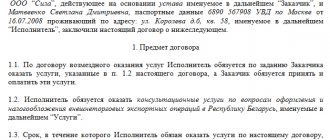General provisions
Russian legislation stipulates the employer’s obligation, when accepting a future employee into the organization’s staff, to properly formalize labor relations with him.
This is achieved by signing an agreement (employment contract), which outlines all the rights and obligations of both the employee and the employer, which they are obliged to strictly observe. Before signing the document, the employee is familiarized with all local regulatory documents of the organization (internal work schedule, work schedule, etc.), as well as with the job description, which spells out all the employee’s job functions.
In many cases, job responsibilities are specified in the employment contract itself, and there may be no separate instructions. (and samples of employment contracts can be found in this article below).
Related documents
- Employment contract with the head of advertising and marketing service
- The wording of the dismissal order in connection with petty theft committed at the place of work
- Form of an employment agreement (contract) with a teacher of a higher state educational institution of the Russian Federation (Appendix No. 2 to the order of the State Committee for Higher Education of the Russian Federation dated September 15, 1993 No. 207)
- Employment contract with the chairman of the HOA
- Agreement for the provision of services for the delivery of invoices and notices
- Act of acceptance and transfer of affairs and positions by the Chairman of the Garage Cooperative
- Civil contract with an employee (with an individual)
- Civil contract with an employee for the provision of services
- Employment contract with a young specialist from a healthcare institution
- Layout of an employment contract
- Sample employment contract
- Example of an employment contract with the General Director
- Sample form of an employment contract between an individual entrepreneur and an employee
- Sample form of an employment contract with an employee of a federal budgetary institution
- Fixed-term employment contract with chief accountant
- Fixed-term employment contract with a University teacher
- Employment contract 1
- Employment contract 2
- Employment contract 3
- Employment contract with the driver
The meaning of an employment contract. Difference from GPC contracts
An employment contract, signed by the parties, is a legal document that defines the creation, modification and termination of the working relationship between employer and employee.
The subject of the employment contract is the employee’s work! Therefore, it is very important to distinguish it from civil law contracts (GPC), such as contracts, copyright or for the performance of a certain type of work, where the subject is the final result (project, book...).
Other differences are that, under an employment contract, the employer himself organizes the employee’s workplace and ensures normal and safe working conditions. Under a GPC agreement, there are no such obligations, just as there is no need to comply with the internal rules of the organization.
What documents should I leave?
There are a number of personnel documents that need to be kept in circulation for the convenience of the employer.
The staffing table, in accordance with paragraph 3 of part 2 of Article 57 of the Labor Code, is a mandatory document; in principle, it cannot be replaced by any other document. It is used to design the structure of the organization, staffing levels and composition of employees.
Expert opinion
Orlov Denis Ignatievich
Lawyer with 6 years of experience. Specialization: family law. Has experience in drafting contracts.
But it is used exclusively by the company’s management and does not affect the activities of employees. the latter do not need to be familiarized with this document.
But the vacation schedule is very important for every employee. And it is also mandatory for the employer.
It is compiled for each calendar year, at the latest, two weeks before the start of the new calendar period. The vacation schedule for 2021, for example, must be communicated to the team no later than December 17, 2021.
And in the standard form of an employment contract there is clause 22, where it is necessary to include a link to this schedule.
The standard form does not contain the necessary wording for a number of other documents that also need to be preserved. These are the Regulations on certification, on personal data, on the protection of trade secrets and on business trips.
Types of employment contracts
It is important to note that if an employee hired under the terms of a fixed-term employment contract continues to work in the organization for more than 5 years, then such a contract automatically becomes indefinite. In this case, there is no need to further re-execute the agreement.
According to the law, an open-ended contract can become a fixed-term one. To do this, you need to terminate the previous contract and enter into a new contract.
According to Art. 11 of the Labor Code of the Russian Federation, labor relations do not apply to:
A) Military personnel in the performance of military duties;
B) Citizens working under civil contracts;
C) Other persons established by Federal Law.
Who has the right to apply the Standard Employment Agreement in 2021?
The above-mentioned Resolution was adopted on the basis of Art. 309.2 of the Labor Code of the Russian Federation, it came into force on January 1, 2017.
The article provides for micro-enterprises the possibility of refusing to adopt local regulations that set out labor law standards. It will be possible to replace these documents (partially or completely) with standard employment contracts from 2021, concluded with each individual employee.
The innovation applies to both organizations and individual entrepreneurs belonging to this category. To do this, they must meet a number of conditions:
- have no more than 15 average number of employees for the previous calendar year;
- income for the previous calendar year should not exceed 120 million rubles;
- additionally for organizations: among the founders, the total share of third-party organizations (both Russian and foreign) is no more than 49%; and participants representing regions, municipalities, religious and public organizations, foundations - no more than 25%.
Accurate information about whether, from January 1, 2021, an organization or individual entrepreneur belongs to the category of microenterprises can be found on the Federal Tax Service website https://rmsp.nalog.ru/ where the “Unified Register of Small and Medium-Sized Enterprises” is posted.
At the top of the page you need to press the “ Search”
» and enter your INN or OGRN in the window that opens.
Then ask the “ Find
” command, and the service will provide information about which category this individual entrepreneur or LLC belongs to.
Please note: the law does not oblige employers to use standard employment contracts. But it only gives the right to choose: to apply local acts or these documents.
If the choice falls on employment contracts, they will be concluded with newly hired employees, starting in January. For existing employees, it will not be necessary to draw up the same contract, but to conclude an additional agreement.
An employment contract with an employee for a specific place of work is concluded once - upon hiring. In the future, if it is necessary to change the employment contract, an additional agreement to the employment contract is concluded. And if there can be only one employment contract, then there can be an unlimited number of additional agreements to it.
Forms and samples of employment contracts
Labor relations between employer and employee are concluded in writing in two copies, one for each. In the employer's contract, the employee must sign that he has received the second copy of the document.
If an employee begins to fulfill his previously agreed upon job duties with the knowledge of the employer, then the contract is considered concluded, even if it was not drawn up in writing.
Download:
Sample employment contract (Word, 59 Kb)
Standard employment contract form (Word, 57 Kb)
Article 309. Documents confirming the period of work with employers - individuals
(as amended by Federal Law No. 90-FZ of June 30, 2006)
An employer - an individual who is an individual entrepreneur - is obliged to keep work books for each employee in the manner established by this Code and other regulatory legal acts of the Russian Federation.
An employer, an individual who is not an individual entrepreneur, does not have the right to make entries in the work books of employees and draw up work books for employees hired for the first time. A document confirming the period of work with such an employer is an employment contract concluded in writing.
Parties, content and structure of the employment contract
In Art. 20 of the Labor Code of the Russian Federation, the parties to an employment contract are the employer and the employee.
An employee is an individual over 16 years of age (and with the consent of guardianship over 14 years of age), medically fit to perform labor functions. For 14 year old employees the following conditions must be met:
– easy work, without excessive physical and mental stress
– consent of the guardian, and in certain cases of guardianship (if the child is under 14 years old, for example for filming a movie, etc.)
– work should not interfere with the educational process
Employer is an individual (IP) or legal entity that is not prohibited by law from concluding employment agreements.
The content of the employment contract is determined by Art. 57 of the Labor Code of the Russian Federation.
It must contain the following information:
– Full name (full name) of the employee and name of the employer
– details of the parties (passport details of the employee and the lessor (if it is an individual entrepreneur))
– TIN of the organization, individual entrepreneur
– date and place of signing the agreement
– place of work where the employee will work (perhaps somewhere in a structural unit or in the “parent” organization...)
- position according to the staffing table
– date (from what date the employee begins to perform his job duties and when he finishes (for a fixed-term employment contract))
– terms of remuneration (tariffs, allowances, conditions for bonuses, etc.)
– work and rest schedule (full-time, shift schedule or summarized recording of working hours)
- guarantees
Additionally, depending on the nature of the employee’s work, the employment contract includes the following conditions:
– about the probationary period
– on non-disclosure of trade secrets
– on full financial liability (only with employees appointed to positions specified in Appendix No. 1 of Resolution of the Ministry of Labor and Social Development of the Russian Federation of December 31, 2002 No. 85. Otherwise, such clause of the contract will be invalid and illegal).
The structure of the employment contract includes the following sections:
- Data of the employee and employer (full name of the employee, his passport data, name of the organization, its legal location, full name of the manager).
- Indication of the position and place of work of the applicant.
- Description of the rights and obligations of the employee and employer.
- Work and rest schedule. The conditions for the formation of remuneration (salary + bonus, salary, rate + percentage, etc.), internal rules are specified.
- Additional conditions due to the nature of the position.
- Signatures of the parties.
Comments on the document “Employment contract with an employee - option”
Personal message | Reply 0
| Svetlana Status: Client | 05/22/2013 at 11:39:23 Good afternoon Please tell me, the manager wants to hire an employee, but does not formally register him. What document, as a personnel officer, should I conclude with him (contract or work agreement? |
Personal message | Reply 0
| Contract-Yurist.Ru Status: Legal company rating 460 | 06/11/2013 at 11:33:57 It is possible to conclude a civil contract with an employee, where the parties act as “customer” and “performer”, “contractor” and “performer”, etc. However, the Employer should be wary of liability if civil law contracts are recognized as essentially labor contracts. When resolving disputes about the qualification of contracts, courts, in particular, pay attention to the following circumstances: - whether a workplace was created for a citizen performing this or that work (providing a service, etc.), whether he was provided with equipment and consumables; — whether the organization issued any administrative acts relating to the activities of a citizen (for example, on the provision of leave); — whether the period of temporary disability was paid; — how the remuneration was paid; - how working hours were recorded; — are there any acceptance certificates for completed work? It is also necessary to correctly use the wording in civil contracts. For example: “The Contractor undertakes, at his own risk, to perform the work specified in paragraph __ of this contract. In this case, the time for completing the work is determined by the Contractor independently within the framework of the term of this contract." “The Contractor undertakes to perform the following work under this contract: to manufacture from the Customer’s (Contractor’s) materials ___________ according to the Customer’s design, ...... within the period from ________ to _________” “The Contractor has the right to engage a subcontractor to perform the work specified in clause ____ of this agreement. “The Customer undertakes to accept and pay for the Contractor’s work within 3 days after the parties sign the acceptance certificate for the work performed... The cost of work under this agreement is ______ rubles” |
Personal message | Reply 0
| Svetlana Status: Client | 06/13/2013 at 09:59:24 Good day! Please tell me what work looks like. contract for the period of absence of the employee on maternity leave. Thank you. |
Reply 0
| 5 Marina | 07/23/2016 at 04:06:18 The agreement is detailed. With some effort, it can be turned into a good contract for construction workers. Thanks for the help. |
Reply 0
| 5 Lyubov Ivanovna | 12/24/2018 at 05:35:02 Thank you very much for your version of the contract, it was very useful. |
Reply 0
| Pauline | 02/28/2020 at 11:35:31 very useful document |
Reply 0
| Tetyana | 05/14/2020 at 09:49:12 A very clear contract |
Video on the topic “Employment agreement, contract”
- Labor law. Work, employment contract, dismissal. Lawyer's answers
- Interview. Labor relations
Termination of an employment contract
Termination of the contract may occur at the initiative of either party.
To terminate employment, an employee only needs to write a resignation letter to the manager 2 weeks in advance. For the employer, everything is different. If, according to the employment agreement, the employee’s probationary period has not expired, then a written notice with a warning of 3 days is sufficient. In other cases, termination of the contract is possible: – liquidation of the organization
– staff reduction
– constant failure to perform his job functions by an employee, his repeated appearance at work in an alcoholic or drug-induced state
– identified facts of theft, intentional infliction of material damage to the organization’s property
– other cases under Art. 81 Labor Code of the Russian Federation.
Obligated persons: do's and don'ts
The topic of difficulties arising in the process of labor relations with obligated persons has long become the most discussed topic both at seminars held as part of advanced training for personnel service employees, and at personnel forums. What features of the legislation should be paid attention to by the employer who employs such workers, we will consider in the article.
First, let's figure out who belongs to the category of persons obligated to reimburse the costs of maintaining children.
The obligation to reimburse the costs of maintaining children arises for parents in the following cases:
– taking away their children by decision of the commission on juvenile affairs;
– taking away their children based on a court decision without depriving them of parental rights;
– deprivation of their parental rights;
– they are on the wanted list, in labor treatment centers or in places of detention;
– serving a sentence in institutions executing punishment in the form of imprisonment, restriction of freedom, arrest (part one, paragraph 8 of Decree No. 18).
At the same time, the costs of maintaining children are not reimbursed by parents recognized as incompetent, as well as by parents who cannot fulfill parental responsibilities for health reasons according to the list of diseases approved by the Ministry of Health in accordance with part three of Art. 93 CoBS, based on the conclusion of the medical advisory commission issued by the state health care organization (part two, paragraph 8 of Decree No. 18).
The obligated persons are both those who work and voluntarily reimburse the costs of maintaining children, and those who do not work.
Non-working obligated persons, as well as working obligated persons who reimburse the costs of maintaining children voluntarily upon application, but not in full, are subject to employment under a court ruling on employment (part one, paragraph 13 of Decree No. 18).
Taking into account the above, we can distinguish the following categories of employees who are obligated persons:
– employees who acquired the status of an obligated person in the course of their work activities and voluntarily reimburse the expenses spent by the state on the maintenance of children;
– employees who acquired the status of an obligated person before employment with a specific employer, and then independently found employment and voluntarily reimburse expenses;
– employees who are obligated persons, employed and reimbursed for expenses by court order.
For reference: the list of diseases for which parents cannot fulfill parental responsibilities was approved by Decree of the Ministry of Health of the Republic of Belarus dated March 30, 2010 No. 36.
Is it possible to impose a preliminary test on the obligated person?
The legislation determines that employment relations with obligated persons can be terminated only after full reimbursement of the costs of maintaining children or after these persons are independently employed in a job with a salary exceeding the salary at the place of work provided, as well as after they are exempted from paying maintenance costs children by court decision (part thirteen, paragraph 14 of Decree No. 18).
If an employment contract with a preliminary test is concluded, the employee has the opportunity to terminate the employment contract with a preliminary test both before the expiration of the preliminary test period (by notifying the employer in writing 3 days in advance) and on the day of its expiration (part one of Article 29 of the Labor Code) .
Based on the above, we can conclude that although Art. 28 of the Labor Code and does not contain a prohibition on the establishment of preliminary testing for this category of workers, but due to the restrictions contained in Decree No. 18, preliminary testing is not established for obligated persons.
Is it possible to conclude a contract with an obligated person?
A similar situation arises in the case of using a contract form of employment. The contract may be terminated at the initiative of the employee upon expiration of its validity period, as well as on additional grounds provided for in subparagraph. 2.10 clause 2 of Decree No. 29.
Considering that at the time of hiring obligated persons it is not possible to determine the specific duration of their employment relationship, an open-ended employment contract must be concluded with employees employed by court order.
How to correctly calculate the duration of labor leave?
Depending on how the obligated person was employed (independently or under a court order on employment), the duration of the labor leave granted to him differs.
As a general rule, the duration of the main vacation cannot be less than 24 calendar days (part one of Article 155 of the Labor Code).
IT IS IMPORTANT! The duration of the main leave of at least 24 calendar days is established for obligated persons who are employed independently (not under a court order on employment) and fully reimburse the costs of maintaining children on a voluntary basis. Also, in cases established by law, such persons are granted additional leave in addition to the main leave.
Obligated persons employed under a court order on employment are entitled to a different duration of the main labor leave - 7 calendar days (part eight, paragraph 14 of Decree No. 18). In this case, the employer has no right to either reduce or increase the duration of the main leave of such obligated persons.
Other labor and social leaves provided for by labor legislation are not provided to obligated persons employed under a court ruling on employment.
In practice, a situation may arise when an employee’s length of leave changes throughout the working year.
Situation 1
For the period of work from November 20, 2014 to May 19, 2015, the duration of the employee’s leave, who was an obligated person in accordance with the requirements of Decree No. 18, was 7 calendar days. For the period of work from May 20 to November 19, 2015, the duration of the employee’s leave, by which time he had fully reimbursed the costs of maintaining children, was 24 calendar days.
How to calculate the total duration of vacation for an employee for the working year from November 20, 2014 to November 19, 2015?
To determine the total duration of labor leave in the situation under consideration, one should use the procedure for calculating it in proportion to the time worked, set out in Art. 177 TK.
The number of full months worked for the period from November 20, 2014 to May 19, 2015 is 6 (181 calendar days / 29.7 (average monthly number of calendar days for the year)). The duration of labor leave per month during the specified period is 0.58 calendar days (7 calendar days of vacation / 12 months). Therefore, the duration of labor leave for the period from November 20, 2014 to May 19, 2015 will be 3 calendar days (6 months × 0.58 calendar days).
In a similar manner, we calculate the duration of labor leave for the period of work from May 20 to November 19, 2015. The number of full months worked for the specified period is 6 (184 calendar days / 29.7 (average monthly number of calendar days for the year)). The duration of labor leave per month during the specified period is 2 calendar days (24 calendar days of vacation / 12 months). The duration of labor leave for the period from May 20 to November 19, 2015 will be 12 calendar days (6 months × 2 calendar days).
Thus, the total duration of an employee’s leave for the working year from November 20, 2014 to November 19, 2015 will be 15 calendar days.
On what grounds can employment relations with obligated persons be terminated?
Until the obligated employee has fully reimbursed the costs of maintaining children, the employer does not have the right to fire him, except for the cases provided for in paragraphs. 1 (except for reducing the number or staff of employees), 2, 8 art. 42, pp. 1, 2, 5, 6 tbsp. 44, pp. 2, 4 tbsp. 47 of the Labor Code and part fifteen of paragraph 14 of Decree No. 18.
Thus, the permissible grounds for dismissal of an obligated person provided for by the Labor Code are:
– liquidation of an organization, termination of the activities of a branch, representative office or other separate division of an organization located in another area, termination of the activities of an individual entrepreneur (clause 1 of Article 42 of the Labor Code);
– the employee’s incompatibility with the position held or the work performed due to a health condition that prevents the continuation of this work (clause 2 of Article 42 of the Labor Code);
– theft of the employer’s property at the place of work, established by a court verdict that has entered into legal force or a resolution of the body whose competence includes the imposition of an administrative penalty (Clause 8 of Article 42 of the Labor Code);
– conscription of an employee for military service (clause 1, article 44 of the Labor Code);
– reinstatement of an employee who previously performed this work (clause 2 of article 44 of the Labor Code);
– the entry into force of a court verdict by which an employee is sentenced to a punishment that precludes continuation of work, or a court decision on the employment of an employee who is obliged to reimburse the expenses spent by the state on the maintenance of children who are on state support (clause 5 of Article 44 of the Labor Code);
– death of an employee, recognition by the court as missing or declared dead, death of the employer - an individual (clause 6 of Article 44 of the Labor Code);
– the commission of guilty actions by an employee directly servicing monetary and material assets, if these actions are the basis for the loss of confidence in him by the employer (clause 2 of article 47 of the Labor Code);
– sending an employee by court order to a labor treatment center (clause 4 of article 47 of the Labor Code).
Upon dismissal of an obligated person on the grounds provided for in paragraphs. 1, 2, 8 tbsp. 42, paragraph 2 of Art. 44, paragraph 2, art. 47 of the Labor Code, the employer on the day of his dismissal is obliged to inform:
– the body for labor, employment and social protection and the internal affairs body (if the obligated person worked on the basis of a court order on employment) to ensure the employment of the obligated person at a new place of work;
– the claimant of expenses for the maintenance of children (if the obligated person voluntarily reimbursed such expenses on the day of dismissal) to apply to the court with an application to recover from the obligated person the costs of maintaining children and his employment in the manner established by Decree No. 18.
IT IS IMPORTANT! A separate basis for termination of employment relations with obligated persons is provided for in part fifteen of paragraph 14 of Decree No. 18. It is also permissible to dismiss such an employee in the event of his independent employment in a new place of work with a salary exceeding the salary at the given place of work.
Situation 2
The citizen, who is an obligated person, was sent by the body for labor, employment and social protection to the enterprise for the purpose of his further employment. After a month of work, the employee informed the employer that he had found a suitable job in another organization offering more favorable wage conditions, and wanted to change jobs.
What should an employer do?
If the obligated person independently finds a place of work with a salary exceeding the salary at the given place of work, the employer has the right to dismiss him for further work with this employer only if the following conditions are met:
– if there is a letter from another employer expressing readiness to employ the specified employee;
– when coordinating such dismissal with the labor, employment and social protection agency dealing with the issue of employment of the obligated person (part fifteen, paragraph 14 of Decree No. 18).
Is it possible to dismiss an obligated person if the employee does not go to work?
Control over the daily attendance of obligated persons at work is carried out by employers together with internal affairs bodies and labor, employment and social protection authorities (clause 10 of Regulation No. 105).
Employers who use the labor of obligated persons are often faced with their absence from work.
Situation 3
After 3 months of working for the employer, the obligated employee does not go to work for a week.
He did not notify the employer about the reasons for his absence, and when trying to contact him by phone, he did not get in touch.
Is it possible to fire him for absenteeism?
As a general rule, absenteeism (including absence from work for more than 3 hours during a working day) without good reason is a disciplinary offense, the commission of which may entail the application of one of the disciplinary measures against the guilty employee, provided for in part one of Art. 198 Labor Code, incl. and dismissal. However, employers who use the labor of obligated persons do not have the opportunity to fire them in case of absenteeism, since dismissal under clause 5 of Art. 42 of the Labor Code is not included in the list of acceptable grounds for termination of employment relations with obligated persons, established by Decree No. 18. If the fact of absenteeism is subsequently confirmed, only a reprimand, reprimand or deprivation of incentive payments can be applied to the employee for its commission.
The employer, as the person responsible for the daily recording of the attendance of obligated persons at work and departure from it, on the day such an employee does not appear at the workplace must inform the relevant labor, employment and social protection authority and the internal affairs body about this (clause 10 of Regulation No. 105 ). In addition, he is also responsible for establishing the reasons for the employee’s absence and taking measures to ensure the obligated person’s attendance at work.
If there is an unjustifiable reason for the absence of an obligated person from work, the employer and the labor, employment and social protection body must contact the internal affairs body for assistance in bringing such a person to work. In the future, the internal affairs body will issue an official warning to the specified employee about the inadmissibility of illegal behavior and, if necessary, ensure his appearance (delivery if this person is found as a result of the search).
For reference:
organizations in which obligated persons work must: – constantly inform internal affairs bodies, labor, employment and social protection authorities about the failure of obligated persons to show up for work; – monthly, within the first 3 working days of the month following the reporting month, submit to the internal affairs bodies, labor, employment and social protection authorities information on recording the working hours of obligated persons, on violations of labor discipline by obligated persons, incl. resulting in a reduction in their wages (working time sheets, orders of suspension from work and other documents confirming facts of violation of labor discipline).
Situation 4
An employment contract was concluded with a citizen who is an obligated person and sent to the organization by the labor, employment and social protection body for employment. After this, he was sent to a health care facility for a medical examination. Subsequently, he never returned to work and did not answer phone calls.
Does the employer have the right to hire another employee for the specified position?
Due to the requirements of labor legislation, during the period of undergoing the prescribed medical examinations, the employee retains his place of work (position) and average earnings (part six of Article 228 of the Labor Code).
If the employer has taken a set of measures to ensure the attendance of the obligated person at work, set out in paragraph 10 of Regulation No. 105, but the employee has not started work, another employee may be hired in his place, with whom the fixed-term employment contract provided for must initially be concluded clause 4 art. 17 TK. In the future, the employer has the right to apply to the court with a claim to recognize the employment contract concluded with the obligated person as invalid on the grounds provided for in paragraph 2 of Art. 22 TK. If this claim is satisfied, the employment relationship with the obligated person will be subject to termination.
Further, a fixed-term employment contract with a temporary employee can be terminated by agreement of the parties (clause 1 of Article 35 of the Labor Code) and on the day following the day of dismissal, the specified citizen can be hired to a previously held position as a main employee.
Documentation:
Decree of the President of the Republic of Belarus dated November 24, 2006 No. 18 “On additional measures for state protection of children in dysfunctional families” (hereinafter referred to as Decree No. 18).
Decree of the President of the Republic of Belarus dated July 26, 1999 No. 29 “On additional measures to improve labor relations, strengthen labor and performance discipline” (hereinafter referred to as Decree No. 29).
Regulations on the employment of parents obligated to reimburse expenses spent by the state on the maintenance of children who are on state support, approved by Resolution of the Council of Ministers of the Republic of Belarus dated January 26, 2007 No. 105 (hereinafter referred to as Regulation No. 105).
Games with terms
The Labor Code, repealed in 2002, considered agreements and contracts as different names for the same legal phenomenon. With the introduction of new legislation, that is, the new Labor Code, the interpretation of the employment contract has changed and it began to mean an agreement between the employer and the employee that is different from the employment contract.
The term contract began to denote the same employment contracts, but with public service employees. Also, military personnel serve under a contract in the armed forces of the Russian Federation.
The reason why the separation of terms was required was the need to separate labor relations into a separate group, which formally fall under the Labor Code, but are regulated by it only in a small part. Basically, special laws related to special types of activities are regulating, for example, laws on the police, on judges, on civil servants, etc.
Labor contracts are the future
Developed economic and industrial relations have long made the employment contract (in its current Russian format) a thing of the past in labor relations.
In the most economically developed countries, the contractual system of labor relations flourishes, as a reflection of the modern economic model of society.
Labor mobility, the rejection of state boundaries in matters of employment, and the rapid change of people’s occupations have made the contractual system of labor relations the most popular. Thus, scientists and researchers in matters of personnel management believe that the optimal period for an employee to be in an employment relationship with the employer will be a time period of no more than three years, during which the employee most effectively fulfills his duties. After this time, productivity necessarily declines.
At the same time, an industrial leader like Japan adheres to the exact opposite model, believing that lifelong employment leads to the best productivity. Of course, comparing the island Japanese mentality with the European or American one makes no sense.
Be that as it may, in the Russian Federation both types of formalization of labor relations operate on a completely equal basis.






